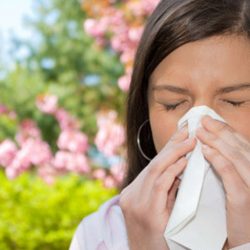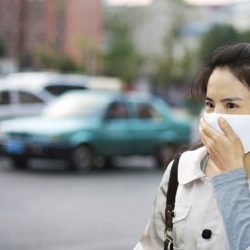A large new Northwestern Medicine® study upends our understanding of vitamin E and ties the increasing consumption of supposedly healthy vitamin E-rich oils -- canola, soybean and corn -- to the rising incidence of lung inflammation and, possibly, asthma. The new study shows drastically different health effects of vitamin E depending on its form. The form of Vitamin E called … [Read more...]
Asthma & Allergies

Asthma, Allergies or ISS?
You can’t catch your breath, and then your doctor treats you for asthma, but it keeps getting worse. It’s a mysterious disease that affects only women, but there’s something simple you can do to change your life. Last year, Laura DiFrancesco lost what she loves to do: playing outside with her family. DiFrancesco told Ivanhoe, “I couldn’t talk in full sentences; I couldn’t … [Read more...]
Eating peanut in early years helps reduce risk of allergy even with later abstinence: King’s College London Study
The early introduction of peanut to the diets of infants at high-risk of developing peanut allergy significantly reduces the risk of peanut allergy until 6 years of age, even if they stop eating peanut around the age of five, according to a new study led by King's College London. Published today in the New England Journal of Medicine, the LEAP-On study followed on from the … [Read more...]
Outcomes of lung transplantations since implementation of need-based allocation system: A Study
Since implementation of a medical need-based allocation system of donor lungs in 2005, double-lung transplantation has been associated with better graft survival than single-lung transplantation in patients with idiopathic pulmonary fibrosis (IPF); at 5 years, there has been no survival difference between single- and double-lung transplant recipients in patients with chronic … [Read more...]
SLIT Therapy for Seasonal Allergies
Itchy, watery eyes, runny nose and lots of congestion. If you suffer from seasonal allergies, you know the feeling all too well. Allergy sufferers can take over-the-counter medication or have a series of shots, but a new therapy may be easier on patients and may eliminate symptoms once and for all. Over the past year, John Mueller has met big challenges head-on. Mueller … [Read more...]
Link between prenatal exposure to paracetamol and risk of developing asthma: A Study
Researchers have provided new evidence that developing asthma can be linked to pregnant women and infants being exposed to paracetamol; by testing that the association was not simply due to the medical complaint for which the person is taking paracetamol. The findings were published in the International Journal of Epidemiology. Co-author of the study, Maria Magnus, commented … [Read more...]
Dietary fibers protect against asthma: A Swiss Study
The Western diet probably has more to do with the asthma epidemic than has been assumed so far because developing asthma is related to the amount of fruit and vegetables consumed. Gut bacteria ferment the dietary fibers contained in them and fatty acids enter the blood as a result, influencing the immune response in the lungs. This has been shown by a research project funded by … [Read more...]
Users of cherry-flavored e-cigarettes may be exposed to higher levels of respiratory irritant: A Study
An analysis of 145 different electronic-cigarette flavoring products reveals that many e-cigarette users may be exposed to a potentially harmful chemical. In a research letter published online in the peer-reviewed journal Thorax, a research team led by Maciej Goniewicz, PhD, PharmD, of Roswell Park Cancer Institute (RPCI) reports that high levels of the respiratory irritant … [Read more...]
Purified cashew proteins lend insight into allergic reactions: A Study
It's well known that peanuts can cause severe reactions in people who are allergic, but research suggests that the risk of developing a life-threatening reaction could be higher for those allergic to cashews. Now scientists have come up with a fast and simple method to purify the three main cashew allergens to help better grasp how they work and their effects on people. Their … [Read more...]
Historical diagnostic labels of asthma and chronic obstructive pulmonary disease (COPD) is an outdated approach: European Lung Foundation Study
Defining a patient's symptoms using the historical diagnostic labels of asthma and chronic obstructive pulmonary disease (COPD) is an outdated approach to understanding an individual's condition, according to experts writing in the European Respiratory Journal today (Feb. 1, 2016). In a perspective article, Professor Alvar Agusti and colleagues call for a new approach to … [Read more...]
Safety Net for Peanut Allergies
You’ve heard of fighting fire with fire. How about treating peanut allergies with peanuts? It’s a new approach to a potentially deadly threat that terrifies parents of allergic children. One brave child is helping researchers in their search for a peanut allergy cure. A few teaspoons of peanut powder at a time and five-year-old Price Capps is becoming one of America’s … [Read more...]
Fiber-rich diet may reduce lung disease: American Thoracic Society Study
A diet rich in fiber may not only protect against diabetes and heart disease, it may reduce the risk of developing lung disease, according to new research published online, ahead of print in the Annals of the American Thoracic Society. Analyzing data from the National Health and Nutrition Examination Surveys, researchers report in "The Relationship between Dietary Fiber … [Read more...]
Vitamin D does not reduce colds in asthma patients: A Study
Vitamin D supplements do not reduce the number or severity of colds in asthma patients, according to a new study published online ahead of print publication in the American Thoracic Society's American Journal of Respiratory and Critical Care Medicine. Loren C. Denlinger, MD, PhD, associate professor of medicine at the University of Wisconsin, and colleagues … [Read more...]
Dietary fibers protect against asthma: A Swiss Study
The Western diet probably has more to do with the asthma epidemic than has been assumed so far because developing asthma is related to the amount of fruit and vegetables consumed. Gut bacteria ferment the dietary fibers contained in them and fatty acids enter the blood as a result, influencing the immune response in the lungs. This has been shown by a research project funded by … [Read more...]
Chemicals in e-cigarette flavors linked to respiratory disease: A Study
Diacetyl, a flavoring chemical linked to cases of severe respiratory disease, was found in more than 75% of flavored electronic cigarettes and refill liquids tested by researchers at Harvard T.H. Chan School of Public Health. Two other potentially harmful related compounds were also found in many of the tested flavors, which included varieties with potential appeal to young … [Read more...]
Vitamin D does not reduce colds in asthma patients: A Study
Vitamin D supplements do not reduce the number or severity of colds in asthma patients, according to a new study published online ahead of print publication in the American Thoracic Society's American Journal of Respiratory and Critical Care Medicine. Loren C. Denlinger, MD, PhD, associate professor of medicine at the University of Wisconsin, and colleagues conducted a … [Read more...]
Anxiety can aggravate asthma: University of Cincinnati Study
Anxiety sensitivity, in simple terms, is a fear of fear. But when people with anxiety sensitivity also have asthma, their suffering can be far more debilitating and dangerous, because they have difficulty managing their asthma. A new study explores this issue and recommends treatment to help decrease asthma symptoms. The study by Alison McLeish, a University of Cincinnati … [Read more...]
Bariatric surgery appears to cut risks for serious asthma-related events: A Study
A study led by Massachusetts General Hospital (MGH) investigators suggests that bariatric surgery can significantly reduce the risk of asthma attacks -- also called exacerbations -- in obese patients with asthma. Their report, published online in the Journal of Allergy and Clinical Immunology, is the first to find that significant weight reduction can reduce serious … [Read more...]
Inhaled diesel pollution and respiratory distress linked: A Study
Researchers in the UK have, for the first time, shown how exhaust pollution from diesel engines is able to affect nerves within the lung. Air pollution is a significant threat to health, they say, and identifying potential mechanisms linking exposure to diesel exhaust and the exacerbation of respiratory diseases may lead to treatments for those affected. Mr. Ryan Robinson, a … [Read more...]
Regular exercise relieves asthma symptoms: A Concordia University Study
Millions of people suffer from asthma. Many report having poor control of their symptoms. Fortunately, new research shows there is a simple antidote: 30 minutes of exercise a day, year-round. In a study recently published in BMJ Open Respiratory Research, experts from Concordia University, the Hôpital du Sacré-Coeur de Montréal and several other institutions* analyzed the … [Read more...]
New Tool to identify COPD: European Lung Foundation Study
A novel approach for the identification of chronic obstructive pulmonary disease (COPD) has been developed by a team of researchers in the USA. The findings, presented at the European Respiratory Society's International Congress, could speed up current diagnosis times for the disease and uncover COPD before serious exacerbations and further loss of lung function have … [Read more...]
Witnessing drug problems or domestic violence causes greater asthma incidence: A Study
No home is perfect, but dysfunction in the home is now revealed to be especially dangerous for children at risk for asthma. A new study shows that children exposed to just one adverse childhood experience (ACE) had a 28 percent increased chance of developing asthma than those with no ACEs. The study, published in the Annals of Allergy, Asthma and Immunology, the scientific … [Read more...]
Air quality in nursing homes affecting lung health of residents: European Lung Foundation Study
The indoor air quality in nursing homes has a serious effect on the lung health of elderly residents, according to the findings of a new study. The study, which is published online in the European Respiratory Journal, is the first to detail the negative effects of poor air quality in nursing homes across several countries. Researchers from the EU-funded GERIE research … [Read more...]
New light on asthma and COPD: A Washington University Study
In diseases such as asthma and chronic obstructive pulmonary disease (COPD), the body produces too much mucus, making breathing difficult. New research from Washington University School of Medicine in St. Louis provides clues to potentially counteract inappropriate mucus production. "The new study lays the groundwork for developing treatments for diseases such as asthma, … [Read more...]
Receptor for asthma-associated virus identified: A Study
Scientists funded by the National Institute of Allergy and Infectious Diseases (NIAID), part of the National Institutes of Health, have identified a cellular receptor for rhinovirus C, a cold-causing virus that is strongly associated with severe asthma attacks. A variant in the gene for this receptor previously had been linked to asthma in genetic studies, but the potential … [Read more...]
Structure of toxin in respiratory infections: University of Texas Study
Researchers from the School of Medicine at The University of Texas Health Science Center at San Antonio today revealed the molecular structure of the cytotoxin from Mycoplasma pneumoniae, a widespread, highly contagious bacterium that infects the lungs. The determination of the structure of the protein, called Community Acquired Respiratory Distress Syndrome (CARDS) toxin, … [Read more...]
Air pollutants could boost potency of common airborne allergens: American Chemical Society Study
A pair of air pollutants linked to climate change could also be a major contributor to the unparalleled rise in the number of people sneezing, sniffling and wheezing during allergy season. The gases, nitrogen dioxide and ground-level ozone, appear to provoke chemical changes in certain airborne allergens that could increase their potency. That, in combination with changes in … [Read more...]
Metabolic imbalance increases risk of respiratory diseases in childhood: A Study
An imbalance in our metabolism can trigger inflammatory processes in the body and activate the immune system. In a recent study, published in the Journal of Allergy and Clinical Immunology, UFZ researchers have been able to show that this applies even to newborns and children under one year of age, and is correlated with the development of respiratory diseases in early … [Read more...]
Medical clowns calm children during uncomfortable allergy test: Israeli Study
The dreaded scratch or puncture test is the most common way of assessing allergic reactions to as many as 40 different substances at once. But because the test involves needles that prick multiple points along the skin's surface, it's a particularly high-stress examination for children -- and their understandably anxious parents. A new study by Tel Aviv University … [Read more...]
Limber lungs: One type of airway cell can regenerate another lung cell type: University of Pennsylvania Study
A new collaborative study describes a way that lung tissue can regenerate after injury. The team found that lung tissue has more dexterity in repairing tissue than once thought. Researchers from the Perelman School of Medicine at the University of Pennsylvania and Duke University, including co-senior authors Jon Epstein, MD, chair of the department of Cell and Developmental … [Read more...]
- « Previous Page
- 1
- 2
- 3
- 4
- 5
- …
- 14
- Next Page »





























